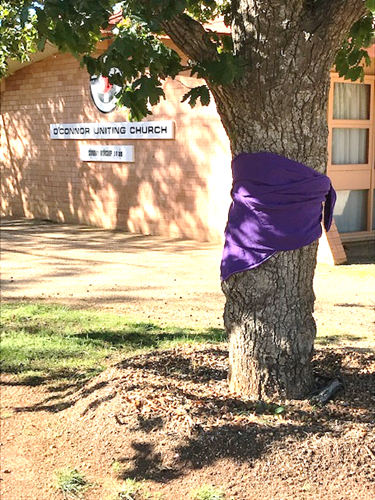Sunday 19th April 2020
19 Apr 2020 by O'Connor Uniting Church in: ReflectionsEaster 2
Bible Readings
First reading: Acts 2:14a, 22-32
Psalm: Psalm 16
Second reading: 1 Peter 1:3-9
Gospel: John 20:19-31

When it was evening on that day, the first day of the week, and the doors of the house where the disciples had met were locked for fear of the Jews, Jesus came and stood among them and said,
“Peace be with you.”
After he said this, he showed them his hands and his side. Then the disciples rejoiced when they saw the Lord. Jesus said to them again,
“Peace be with you. As the Father has sent me,
so I send you.”
John 20:19-21
Our People and Our Stories April 2020
We are celebrating!

Vanessa’s Story
I was reading Richard Rohr’s summary of his messages this past week. He mentioned all the faiths that represent their message by tying coloured prayer flags, colours which represent certain times in their calendar, elements of their faith year etc. I was prompted to think of tying purple around a prominent tree at the church.
It was about 6 am. I had been awake most of the night and was seeking sleep. Then I thought, if Mary can run to the tomb at first light why can’t I get up and take my purple table cloth to tie around the tree. There may not be many people out and about but even if one questions it or thinks about it then it is good.
At the same time we are making a statement that we are celebrating Jesus’ rising from death to bring us into a personal relationship with God through his righteousness.
We are full of hope and excited praise and we have a purple swathed tree to testify to that state in which we live.
Lesley's Psalm
To our living, loving God
I thank you Lord for you have saved me
And brought me into your wonderful love!
You are my help, my strength, You change me
You guide and direct my thoughts from above.
You broaden my knowledge and understanding
Of this world and the people you love.
I am amazed to know that you are real!
I can hardly grasp that You are the One
Who is the Lord and Creator of all,
The living God from whom all things come
And to whom all things are going....
When my life is ending on this earth
You will still be there, watching over me.
When I can no longer care for myself
You will take me somewhere heavenly
To unite with all who respect your worth.
O anxious heart, always seek the Lord!
Allow not the burdens of daily life
And of a world without accord
To crowd out the reality of the living God.
A Prayer from Iona
Jesus you were not immune
To being disturbed or unsettled,
But you also knew
How to face those sensations
And to collect and steady yourself
So that you could press on with the journey
To which you were committed.
Help us to grow in our capacity
To meet our turmoils
And, like you,
To learn from their uncomfortable embrace
That we too
Might be able to ready ourselves
To meet what lies ahead.
Amen.
Encouragement and teaching from Canberra Region Presbytery Ministers
From Rev Andrew Smith, Presbytery Minister: Congregation Futures
I will spend at least one period of the week listening for the Spirit’s voice
In this time of isolation in our homes I wonder whether you are finding any solitude. Isolation does not necessarily translate to solitude. Your isolation may well be very busy with people working from home, children being home from school and finding ways to entertain yourself and others. With everyone home it may be hard to find a quiet space or time for solitude.
Solitude, silence and prayer are central to Michael Frost’s third habit of highly missional people in his handy little book Surprise the World. The third habit is: “I will spend at least one period of the week listening for the Spirit’s voice”.
Frost gives some useful hints for setting up regular times of solitude, silence and prayer, including setting aside a designated time, eliminating distractions and using centering prayer to listen to the Holy Spirit rather than telling the Holy Spirit what you want.
This listening for the Spirit’s voice is important as God shapes us as missionaries and fills our hearts with love for those to whom he sends us, and nurtures and sustains us in the practices of generosity and hospitality for the first two habits of blessing and eating with others.
So what might you hope to hear from the Spirit in these times of solitude, silence and prayer? Frost suggests that the “Spirit might bring to your mind the name or the face of a person you are to bless or eat with” or prompt you to reengage with someone you blessed last week, or bring to mind something you could have said to someone but didn’t. Frost also acknowledges that as we seek to live missional lives in our local communities we will be faced with negotiating the extremes of entering fully into a social setting that might be considered ungodly on the one hand, and on the other hand being withdrawn and judgmental of those settings. As we negotiate these extremes, we might hope to hear from Spirit about how to sit somewhere in the middle – “a godly, intriguing, socially adventurous, joyous presence in the lives of others”.
Stories from across the Presbytery gives us an inkling of the Spirit’s promptings for congregations to bless some of the most vulnerable of our local communities in these times of COVID-10 restrictions:
- A congregation stretching to see if it can safely bless people who are homeless by making a shower in its buildings available for use following the closure of the regular showering facilities at the local swimming pool.
- Another congregation with a food relief service imagining how they can partner with delivery runs of local restaurants and chemist for delivery of food hampers when their own volunteers are too much at risk for undertaking the deliveries themselves.
- A member of the church creating a facebook group for the families of the child services that his children had attended. This way the children and families can stay in touch with each other, retaining some familiarity in times of immense change for the little ones.
In this time of isolation, may you find solitude. And in that solitude may you hear the Spirit’s voice shaping, nurturing and sustaining you as missionaries.
From Rev Dr John Squires, Presbytery Minister for Wellbeing
We are now in the season of Easter. It stretches for fifty days, from Easter Sunday up to Pentecost Sunday. Throughout this season, in place of a reading from Hebrew Scriptures, we follow passages from the book of Acts, the second volume in the orderly account which, by tradition, is attributed to Luke.
The passage set for this Sunday (the second Sunday in the season of Easter) places Peter in the public square, making a speech to the crowd which had gathered in Jerusalem on the Festival of Pentecost (Acts 2:1). This is but the first of many such speeches, delivered by Peter and other followers of Jesus, in public locations. It is also a striking example of “public theology”, articulating the Gospel in the public arena.
Peter: orator and prophet
There are many speeches reported in Acts. This speech, attributed to Peter, sets a pattern for those ensuing speeches. In form, it follows hellenistic rhetorical conventions, even though Peter was a Jew and is later described as being “uneducated and ordinary” (4:13). This speech, like all others in Acts, was undoubtedly written by Luke; it is not a verbatim report of what Peter said.
Luke wasn’t present for this speech, or the others he has included in Acts. He operated in the style of hellenistic historians, who crafted words appropriate for the speaker and the occasion (Thucydides, Hist. 1.22.1). Even though Peter was a mere Jewish fisherman, it is important for Luke to present him as a polished Hellenistic orator.
Peter’s speech is the first in a sequence of speeches in Acts in which, as a whole, the larger story of Jesus and Israel is linked with the events that are taking place. This is how Luke conveys the way the apostles preached—emphasising things that were of importance to him. What they actually said, we cannot know.
On the day of Pentecost, Peter’s prophetic role had placed him in a position of leadership within the community, as well as propelling him to public prominence. His speech provides a foundational model for this kind of public prophetic leadership. In this speech, Peter interprets the phenomena of the day, articulates the significance of Jesus, and describes the nature of the community. This Sunday’s reading focusses on the middle item of these three features. The other elements are taken up on subsequent Sundays during Easter.
from An Informed Faith https://johntsquires.com/
This blog is based on a section of my commentary on Acts in the Eerdmans Commentary on the Bible, ed. Dunn and Rogerson (Eerdmans, 2003).
John T Squires.